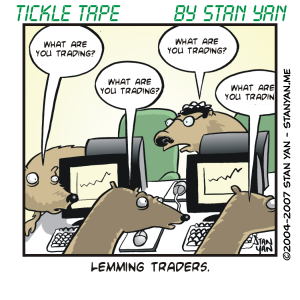Overconfidence is one of the most prevalent psychological problems traders face. We’ve covered many different ways that traders can be overconfident in past columns: Overconfidence may reflect deep psychological conflicts for some people or universal cognitive biases to which all humans are prone. Sometimes, however, overconfidence is simply a matter of having difficulty breaking old habits.
As the old saying goes, “practice makes perfect.” But sometimes, over-practised trading strategies may be executed too “automatically” even when the setup isn’t quite right. Sometimes, it is necessary to learn alternative behaviours, or “relearn” how to trade.
It’s vital to hone your trading skills so you can execute trades freely and intuitively. The mind has limited resources, and through practice, one can engage in multiple tasks simultaneously, and “expand” the mind’s limited capacity. The best example of automatic processing is driving a car.
When you first learned to drive a car, it was very deliberate: You carefully hit the brakes when you anticipated a potential road hazard and focused your attention on accelerating when the trouble had passed. As you gained driving experience, however, much of your driving behaviour became “automatic” in that you no longer needed to pay attention to it. Now, as experienced drivers, you can easily do many tasks while driving: adjusting the radio, glancing in your mirrors, keeping track of your speed.
A similar psychological process occurs as trading experience is gained: you no longer need to carefully evaluate certain trade setups closely. You now can act on a “hunch” or your “intuition” and be right most of the time. This form of automatic processing allows you to trade efficiently. You can do more with less psychological energy.
But what happens if trading on “automatic pilot” no longer works? Market conditions are continually changing and a strategy that worked last week may not work today. When this happens, you must learn to use a new strategy. This may be harder than it seems, however.
Have you ever tried to change your approach after you have developed a skill? Have you tried to improve your golf swing, or learned a new way of doing things after years of practice? In some ways, it is harder than starting over. You have to learn a competing method and try to stop using your old method. For example, consider a person who is learning to drive a “stick shift” or manual transmission after driving an automatic transmission for several years. In many ways, it’s like learning to drive all over again.
You’ve got to hit the clutch pedal as you hit the brake pedal, shift into first gear, and carefully let your foot off the clutch as you move forward. But there is a big difference from when you first learned to drive: You’ve already driven for years and there is a strong tendency to forget about concentrating on a new skill and just do it the “old way.” That is, you may forget to hit the clutch when you brake or shift into a different gear without hitting the clutch.
This is a form of “overconfidence.” One forgets that he or she does not know how to drive a manual transmission and reverts to the “old” and automatic way of doing things. The same thing can happen when you try to learn a new approach to trading; you may trade “automatically,” if you are not careful. When learning a new skill, be focused and deliberate. Pay attention and focus more closely on each action, until you replace your old method with your new method.
Remember, old habits are hard to break, but if you pay attention and practice, you can replace an old approach with a new one.


